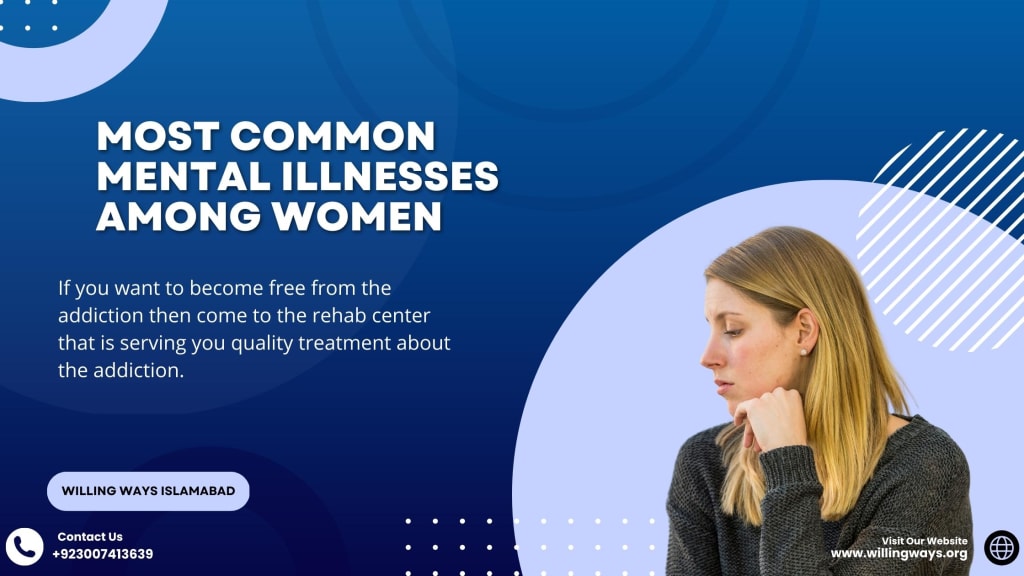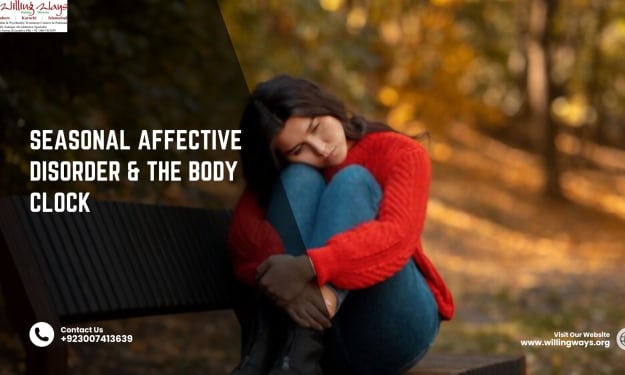Most Common Mental Illnesses among Women
Most Common Mental Illnesses Methods

Depression and Depressive Illnesses
Depression is characterized at the best addiction treatment center in Islamabad by a feeling of overwhelming sadness or melancholy. Other symptoms can include extreme fatigue, loss of interest in formerly enjoyable activities, a sense of worthlessness or hopelessness, and changes in appetite and energy levels. Depression can be episodic with bouts that last hours, days, weeks, or longer. It can also be chronic people who have children that are indulged and want relief from Codeine Addiction Withdrawal are really helpful to many people where the feeling never goes away.
Women are twice as likely as men to experience depression and other depressive disorders such as bipolar disorder. Women who suffer from depression are also more likely to turn to drugs or alcohol for relief. When a woman makes the choice to get treatment for alcohol or drug abuse, she will likely need to be treated for the co-occurring disorders in order to really begin to heal.
Panic Disorders
Of the wide breadth of panic disorders out there, women are more likely to experience generalized anxiety disorder and specific kinds of phobias. It is estimated that 4 million people in the US suffer from a generalized anxiety disorder, and women are twice as likely to develop it as men. Episodes of anxiety, anxiety, or panic attacks can last a few minutes or hours. While some with generalized anxiety disorder experience constant mild to moderate feelings of anger, tension, and worry, anxiety or panic attacks often come with an overwhelming sense of these feelings.
Eating Disorders
Studies indicate that while there are many men who have eating disorders, women make up 75 percent of the people being treated for eating disorders in the US. Eating disorders are considered mental illnesses because many factors that contribute to eating disorder development are mental or psychological. Issues such as low self-esteem, negative body image, and feeling out of control of one's life can all contribute to the development of an eating disorder. According to Everyday Health, women account for approximately 65% of cases of bulimia and 85% of cases of binge eating disorder.
Other Factors that Contribute to Mental Illnesses in Women
There are other issues besides gender and biology that can lead to the increased likelihood that a woman will develop a mental illness.
From a historically cultural standpoint, women have had a subordinate role for much of history. Since the beginning, women have been placed in the part of the keeper of the house and the primary caregiver of aging relatives and young children. As our culture has shifted, more and more women are taking on the roles of primary breadwinners, having more powerful and demanding careers, and working outside the home. Many women still struggle with leaving behind the more traditional roles, and many more women try to do it all. The stress of dealing with everything that comes with being the head of a household, the primary caregiver, and having a demanding career can lead women to panic attacks and depression.
Also, throughout history, our culture has done much to sexualize and objectify women in the media. The media is usually a good example of how women are perceived in culture. The frequent perception that women are purely sexual beings who should look as they do in the media and behave as they do in the media can lead to the development of low self-esteem and a poor self-image among females leading to eating disorders, depression, and anxiety. These ideas of women also perpetuate the attitude that rape and sexual violence are acceptable behaviors. This can all lead to increased drug or alcohol use and mental illness for women.
About the Creator
Willing Ways
Willing Ways is the Best addiction treatment center in Pakistan. We are the pioneer in drugs & alcohol treatment centers with outstanding services and a history of 43 years. We deliver quality writing that is beneficial for you.






Comments
There are no comments for this story
Be the first to respond and start the conversation.